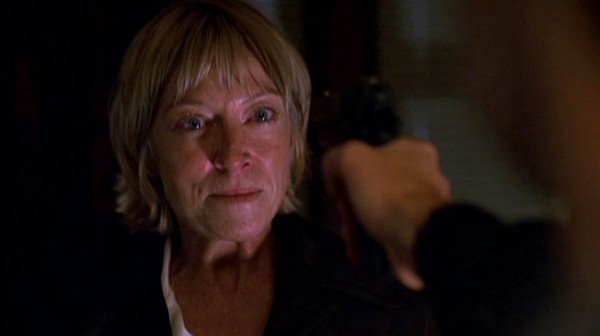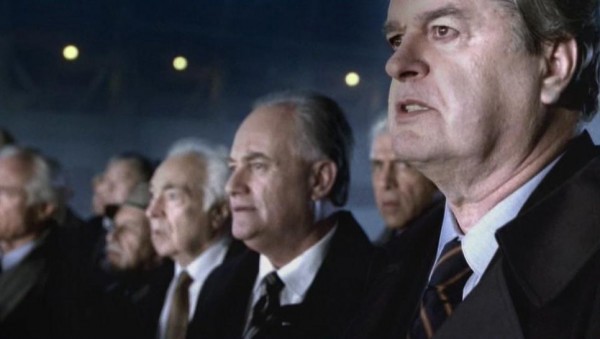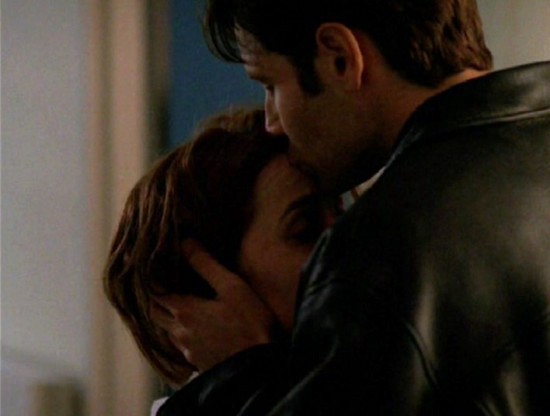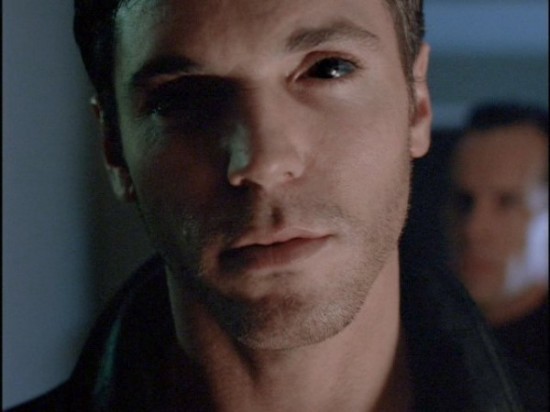Love And Other Conspiracies Of "The X-Files"
by Josh Fruhlinger

The best time to get involved in a conspiracy theory is in media res. A really good conspiracy needs years to pile up the evil plans and secret knowledge into a baroque edifice worth caring about. At its beginning, it’s just a bunch of people with some sinister ideas, and where’s the fun in that?
So I think I got really enthusiastic about “The X-Files” and its ongoing storyline of a human-alien conspiracy precisely because I came into it in the middle. I had seen an episode or two of the first few seasons, enough to get the general gist of the show; but it was only after I moved to California in the summer of 1996 that Friday night viewings of the show became the linchpin of my small, tentative social circle. The first two episodes I saw under these circumstances were a repeat of the previous year’s finale, “Talitha Cumi,” and the season premiere, “Herrenvolk.” This two-parter involved miraculous shape-shifting aliens, mysterious stoic conspirators talking in riddles, and a host of characters alive and dead who longtime viewers were expected to recognize. The details were explained to me quietly and obliquely during commercial breaks by my friends who had been watching the show since its first season.
This is number two in a series about our favorite TV shows past.
Previously: The Theology Of “Angel” In The City Of Demons
It was a disorienting viewing experience, but instead of alienating me, it immediately got me hooked, like a lot of other people in America already were. “Herrenvolk” was watched by 21 million people, an unknown but probably substantial portion of whom were, like me, watching with friends with the lights turned off. My little group came together weekly for much of the next three seasons. By the spring of 1999, though, we had begun to drift apart a bit, and — truth be told — the quality of the show had begun to slip. The last show I remember actually watching when it aired was “The Unnatural,” an odd and kind of self-indulgent episode about a Negro League player in the 1940s who was secretly an alien. I missed the end of the conspiracy just as I missed the beginning.
A few months ago, I discovered that the series was available to stream on Netflix and was immediately seized by the urge to revisit it. 200 episodes over nine years, plus two feature films, was more than I could commit to, but there was an obvious approach to whittle those numbers down. Most people who watched the show know that there were two kinds of episodes: “monster-of-the-week” episodes, where FBI Special Agents Mulder and Scully investigated, and more or less solved, crimes involving isolated incidents of the paranormal; and “mythology” or “mytharc” episodes, which told the unfolding story of an alien race plotting to colonize the Earth along with human collaborators. There were only 60 of the latter (the list of episodes on Wikipedia helpfully marks them for you) plus one movie, which made for a more manageable prospect.
And this was secretly exactly what I’d wanted even the first time I saw the show. I loved the conspiracy theory episodes, even though I couldn’t tell you what was happening half the time. I loved the vibe of them, the sense of looming panic and titanic struggles happening just off-screen. They had some of the best villains and gimmicks — the mind-controlling black oil that seeped through your pores and streamed out your eyeballs, the implacable shape-shifting alien bounty hunters, and the Smoking Man and Krycek, the only characters on the show other than Mulder who seemed to have any kind of sense of humor. But at the same time, I really did want to understand just what was going on. When the show was airing, every time a mythology episode came out, I could never be sure if I wasn’t quite following it because I hadn’t seen the first three years of the series, because I had forgotten a crucial detail from an episode weeks or months earlier, or because the series really was withholding information from the audience. But now I would track down the whole rotten “X-Files” conspiracy, from beginning to end. Like Agent Mulder, I wanted the truth — I wanted to believe that there was a truth that I could learn by watching the show.
***
Here’s the most shocking truth I learned while revisiting the series: in the mythology episodes, Mulder and Scully don’t do much of anything. I mean, they do a lot of running away and shooting at things and barely escaping and whatnot, but the action of the story, once you discern it through the atmospheric murk, turns out to be driven almost entirely by the actions of others.
The two-parter “Two Fathers”/”One Son” is a great example of this. Broadcast in early 1999, about halfway through the show’s sixth season, it’s the climax of the mythology as most viewers probably remember it. The first episode revolves around Cassandra Spender, a recurring character who’s been abducted and experimented on by aliens (or maybe by the U.S. government, or maybe both) repeatedly over the years. Now she’s back from her latest abduction, and while previously she had been sort of a prophet of the benevolent aliens who she said would soon arrive to bring humanity to new levels of spiritual happiness, she now realizes that these beings mean to destroy humanity, not save it, and that she, as the successful result of decades of work to create a human-alien hybrid, is an instrument of their evil plan. Meanwhile, the Syndicate, the group of comically sinister old white men who have been trying to make a separate peace with the invaders, have learned about a civil war within the alien race, and consider — but ultimately decide against — joining the alien rebellion.

The first of the two episodes ends pretty thrillingly: Cassandra, realizing that her recent transformation into a hybrid will herald the beginning of the invasion, arrives at Mulder’s apartment and demands that he kill her to save humanity. It’s a meaty dramatic moment for the series’ protagonist. Cassandra is a character who’s always had our sympathy, but her mental stability has also been in doubt. Does Mulder trust his own crazy beliefs enough to gun down a woman he (and we) have come to care about? How can he know if this is the right thing to do or not? But as next week’s episode begins, he’s saved from having to make the choice: men in hazmat suits burst in and take everyone away to a secret CDC facility. And at the end of the episode, the Syndicate has gotten a hold of Cassandra and gathered in an airplane hanger, awaiting the vanguard of the alien invasion force — but instead the alien rebels arrive, grotesque disfigured beings with their eyes and mouths sewn shut, and kill everyone with high-tech flamethrowers (except for the wily Smoking Man, who manages to sneak away, of course).
Visually, the fiery end to the episode was an amazing and satisfying sequence — it was one of my strongest memories from when I watched the show the first time around — and so it seems kind of churlish to point out that Mulder and Scully, the series’ ostensible protagonists, aren’t involved in it at all. Let me say that again: the Syndicate, the villains whom our heroes have been struggling against for six seasons of the top-rated show on TV, are ultimately defeated and killed not by any actions by those heroes, but by literally faceless aliens who have no dialogue and only the sketchiest of motivations. Mulder and Scully aren’t even there.
This is just an extreme version of something that happened in the show all the time. Most of the conspiracy episodes fall into a pattern: something mysterious happens that piques the agents’ interest, they follow leads, someone on the inside gives them vital information, they promise to protect that person, that person is killed, they must fight for their lives in some way and then… they catch a glimpse of the truth. But just a glimpse, one that’s usually snatched away before it can be recorded or shown to anyone else. I swear, this empty warehouse was full of half-formed clones floating in tanks just an hour ago! There’s rarely any real sense that our heroes have done anything more than briefly delay the villains’ plans.
This structure does have an appeal, despite the lack of what you might call conventional narrative movement: It puts you in Mulder and Scully’s shoes, and together you and they gain access to hidden knowledge. Much of the effort goes into not fighting the conspiracy, but just understanding its contours. The show’s constant refrain is that the truth is out there. For both agents, just learning this truth becomes, in the absence of other victories, the overriding goal.
And yet the thrill of a conspiracy theory comes from not knowing all the details, of filling in the blanks as you try to understand the powers that are ranged against you and/or mankind. And so the more Mulder and Scully learned about the evil plot, the show’s writers had to keep coming up with more details to dangle just out of our sight, so that the grand conspiracy wasn’t reduced to what could fit on a TV screen. After a while, the strain began to show. At one point early on, Assistant Director Skinner, the agents’ boss, speaking of the conspirators, growls “These men don’t have names!” through his perpetually clenched teeth. Necessary as I suppose this is to cultivate an air of mystery around the villains, it just as necessarily gives rise to some awkward dialogue when our characters actually have to talk about these people. (“You met with him, didn’t you?” “Who are you talking about?” “You know who I mean!”) The nameless men do develop personalities, after a while, because that’s also a dramatic necessity. But mostly when they’re on screen, they’re spouting conspiratorial nonsense at each other. Their dialogue is indirect, and suspiciously lacking in proper nouns. Why won’t they just say the things to each other that they all know? It grows increasingly absurd episode by episode.

Worse, the attitude seems to start to infect the protagonists as well. In some ways, it seems the more Mulder and Scully learn about the conspiracy, the less they talk about the details, even with each other. The horrifying information they’re learning is too heavy, too much, and the tone of the series becomes increasingly grim. By the time the Syndicate is incinerated, Mulder, Scully, and their allies have come to talk just like them.
This perhaps reaches a climax in the eighth season, when Mulder is actually abducted by a UFO, discovered dead months later, given a funeral, and then dug up and found to be miraculously alive. And yet we never see anyone ask him what happened, exactly. During his absence, we were intermittently treated to fetishistic footage of him naked and strapped to an alien experimental table. What was that about? The truth suddenly seems too awkward to discuss.
***

You know what the biggest unexpected revelation I got from re-watching the conspiracy theory episodes was? Mulder and Scully are totally a couple by the end of the show.
Really! I hadn’t exactly spent the last decade avoiding “X-Files” spoilers, so I’m not at all sure how I managed to not know this. Maybe it’s because, despite the fact that the intense relationship between the two was one of the show’s main draws, despite the fact they were the pair that introduced ‘ship’ as a verb into the pop-cultural vocabulary, there was never a dramatic moment during Sweeps Week when they passionately kiss and fall into each other’s arms and then we fade to black and later Scully starts calling Mulder “my boyfriend.” They just get… more intimate, more touchy-feely, until eventually, just before Mulder is taken away by aliens, we see them in bed, cuddling fully clothed, comforting each other about something terrible that’s happened, and there’s really no doubt about what we’re looking at.
Their relationship ends up coming across like all the other knowledge the characters are terribly burdened with: hovering in the background, never spoken about. It doesn’t seem like a source of strength to them, but rather is just one more thing to be stressed and sad about when circumstances ensure that they can never be safe together. (The in-show circumstances behind this are murky and confusing, involving Mulder being first abducted and then on the run from shadowy government forces afraid of what he knows, even though Scully and their other allies know most of the same stuff. The real-world circumstances were of course David Duchovny’s ultimately failed stab at movie stardom.) It’s only in the final season when their romantic relationship is explicitly acknowledged, and it’s done in a particularly creepy and joyless way: yet another shadowy government operative, proving to Scully how much he knows about her, tells her all about her life, about how she “spent too much time alone” and that eventually she “invited Mulder to your bed.” She responds by bursting into tears.
During my initial run of “X-Files” viewership, I had been rooting for Mulder and Scully to get together fairly hard. Watching it again now, I realized why: I spent a good chunk of the 90s in a series of intense, ostensibly platonic relationships with women who I was totally in love with. We would be “best friends,” spend a lot of time together, and of course not discuss the most important thing in our lives, our weird not-relationship, which was in fact a constant emotional drain. So of course, Mulder and Scully’s are-they-or-aren’t-they thing made sense to me, while I was watching the show the first time around. They were caught up in a two-person conspiracy so dangerous they couldn’t talk about it, even with each other. Watching them surreptitiously mooning over each other now, years later, was painful, and so when they actually got together just to make sad eyes of sadness at each other, my reaction was one of faint disgust combined with there-but-for-the-grace-of-God-etc. Here’s what happens with hidden conspiracies, in the end: They either vanish when you look at them too closely because they were never there in the first place, or they just turn out to be more real life that you didn’t know about before. But that sick thrill you felt about them goes away either way, and it’s better that it does.
***

One thing I felt adequately prepared for before I started rewatching the show was relentless 90sisms. These were certainly felt in the jokey cultural references (the prize goes to an early episode in which Mulder addresses an unruly group of teens as “Spur Posse”), but much of the deeper paranoid feeling of the show has a very Clinton-era feel to it as well. There are black helicopters. There are angry Gulf War vets suffering from diseases that the government can’t or won’t explain. And even though the heroes work for the FBI, there are thrilling moments when the perspective abruptly shifts, when our heavily body-armored protagonists burst into makeshift camps of culty weirdos and you think about Waco and your sympathies are not with the shouting Feds with the guns.
Still, nine years is a long time, and you can get a bit of whiplash if you run through them in a couple of months. By the end of the show’s run, in 2002, everyone has the cell phones and Internet access that would solve all the problems about ten minutes into many of the early episodes. And the paranoia has shifted too: now the secretive shadow government operatives work for the NSA and sneer that the Constitution “allows foreign terrorists to live here and enjoy the American dream, until time comes to destroy it.” In the final episode of the series, “The Truth,” Mulder is put into an orange jumpsuit and tried before a military tribunal somewhere that’s not exactly Guantanamo Bay but not exactly not Guantanamo Bay either.
If, like me, all you ever wanted was the truth about the decade-long “X-Files” conspiracy storyline, you could do worse than watch that 90-minute episode, which uses flashback sequences at Mulder’s trial to pretty much explain all. You could also watch “One Son,” skip to around the 17:30 mark, and watch the Smoking Man talk for five minutes. He gives a remarkably succinct and typically charming precis, and while there’s more to it, you’ll get the gist.
Between “One Son” and “The Truth” there’s a lot of meandering mytharc that pretty much goes nowhere and includes, among other embarrassments, some ancient buried UFOs covered in verses from all the world’s sacred texts, written in Navajo. Then, in the last season and half, things start to get a bit more interesting again. There are these unkillable “super soldiers,” see, bioengineered by the government using alien DNA, only now they’ve infiltrated the highest levels of power and… well, you know. Series creator Chris Carter was apparently convinced that the show could go on another ten years, and was in the process of easing out Mulder and Scully and replacing them with new characters played by Robert Patrick and Annabeth Gish. They needed a new conspiracy to fight, and if the new one contradicted the old one — and it did — it’s not like the details were ever as important as the mood.
When it comes to actual conspiracy theorists, I think there are two categories. First, there are the people who really go down the rabbit hole, piecing shiny, unrelated details together into a lunatic tapestry; and then there are the people who hear the first type summarize their findings and decide to believe it because they like the way it makes them feel, who believe that the ATF set the fires in the Branch Dravidian compound or that Bush did 9/11 or that Obama lied about his birth certificate because, after all, isn’t that the sort of thing they’d do? Eventually you lose interest, until the next thing comes along. But if you’re going to do a conspiracy theory as art, it’s best not to drag it out to that point. Solve the puzzle. Defeat the villain. Kiss the girl. It’s not how American network TV works — American network TV involves telling the same story over and over again until it stops making money — but it’s more satisfying that way.
Fox cancelled “The X-Files” in 2002, while the ninth season was being filmed. In “The Truth,” Mulder discovers one last piece of data about the looming alien invasion: it will take place on December 22, 2012. “The Mayans were so afraid that their calendar stopped on the exact date that my story begins,” cackles the Smoking Man, right before he’s killed by a missile fired from a black helicopter. The episode ends with Mulder and Scully holding each other in a hotel room, trying to convince themselves that there’s still hope in the world. Carter, Duchovny, and Gillian Anderson have all expressed hope that an “X-Files” movie depicting the final alien invasion will be made at some point, if the money can be found. There’s no sign that this will happen any time soon.
Previously in series: The Theology Of “Angel” In The City Of Demons
Josh Fruhlinger lives and writes and edits things in Baltimore. If you’d been following him on Tumblr or Twitter, you would have seen a lot of X-Files jokes over the past few months.
